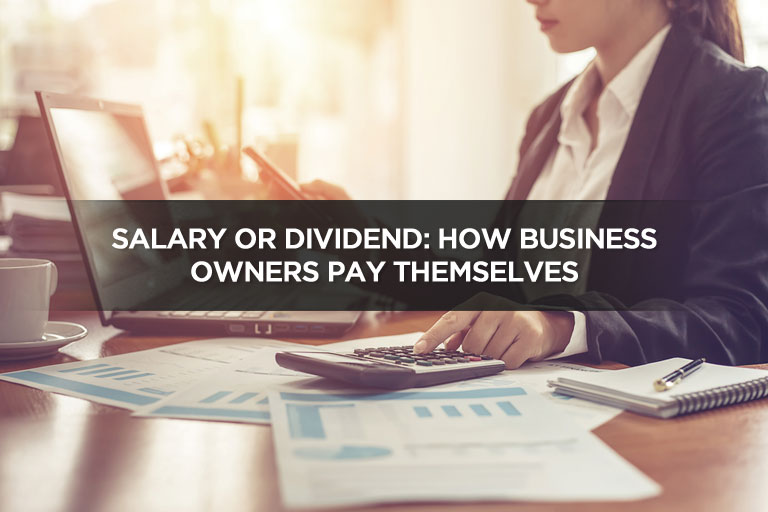0/5
(0 Reviews)


If you’re a new business owner, you might wonder what you do to ensure you can pay your personal bills. You provide products or services, the customers give your company money, and you pay your business bills.
But what about your mortgage, utilities, or buying your own groceries? That comes from your income, and it can be hard to know exactly how much — and how — to pay yourself.
A sole proprietor simply keeps all the income from the business and it’s reported as personal income. However, if you have a corporation you have additional options. Let’s look at how business owners pay themselves!

No one goes into business planning to work for free, but many new businesses find that they struggle to make ends meet in the beginning. This might mean that you can’t hire as many employees and also that you can’t afford to pay yourself.
Over time, your profitability improves but it’s hard to know when it’s ok to invest less in business growth and pay yourself. Or, you might find that you’re keeping all the business profits and not investing enough in the company.
Don’t operate from a scarcity mentality and fear giving yourself any money. No one does their best work without compensation. Even a modest payment can help you avoid burnout and resentment toward your company.
Create a budget for both your personal needs and your business. How much does each need? Does the business bring in enough to meet both budgets? Do you have a partner or spouse who also has personal income?
Balancing budgets isn’t easy, but it’s important to pay yourself without going overboard. It’s a challenge, and you can make adjustments over time as needed.

When people look at how business owners pay themselves, they often assume that company founders take a salary. Many business owners with a corporation set up a salary while also taking part of their pay in dividends.
Setting your own salary can be difficult, and you also have to decide how frequently to pay yourself. Many founders choose a salary that makes sense for their needs and taxes.
For example, if you have a small lawn care business, it’s helpful to pay yourself a salary from your profits for several reasons. A salary allows you to contribute to the Canadian Pension Plan, which helps set you up for retirement. If you don’t have a salary all the way until you retire, you might not qualify for your pension. You can also use your wages to fund your Registered Retirement Savings Plan and get a tax deduction for doing so.
Having a salary can also help you qualify for loans, such as a home mortgage. Simply taking dividends doesn’t give you the guaranteed, predictable income that banks look for. The same goes for business loans — a salary is a better proof of income to show your creditworthiness.
When you pay yourself a reasonable salary, it helps you stay focused on working hard and growing your company. Also, your salary, along with any bonuses you pay yourself, are considered tax deductions for the business. Over time, you may hire additional employees and pay them fair wages as well.
Why don’t business owners just take a salary, instead of also using dividends? The simple answer is the tax burden. As a business owner, you have to pay both the employer and employee contributions to CPP. You also have to pay income taxes on 100% of your salary.
In addition, a set salary is a non-negotiable business expense. You can’t reduce it during tougher months and get more during profitable seasons.
This is why most business owners in choose to take a reasonable but modest salary but increase their income by also taking dividends from company profits.
As a shareholder in your company, you can declare dividends any time you’d like and transfer the money from the company to your account. There’s no limit to the number of transactions you can make in a year. You simply write yourself a check from the corporation, update the company’s minute book, and prepare a director’s resolution for dividends paid.
Taxes are simpler for dividends, although you should keep in mind that this money has already been taxed at the corporate rate. You are taxed at the dividend rate, rather than the income rate. Also, you don’t have to make CPP contributions from dividend payments, which can save you money.
Paying with dividends is easier and less of a headache from a paperwork/processing prospective. If you use only dividends as payment, you only have to fill out a T5 once a year. You also don’t incur penalties for payroll mistakes.
A dividend isn’t tax deductible for your company the way a salary is. Also, you won’t earn room for RRSP contributions if you get paid only with dividends. You may also struggle to claim other tax deductions, such as child care, that can be deducted from your regular income but not from dividends.
You also don’t have the benefits you get from salary payments, such as a stable, provable income that can help you qualify for loans or a mortgage.

Thinking through how to pay yourself as a business owner can take some thought, and it’s a good idea to consult with a tax professional or business financial advisor before you make your final decision.
The one common denominator, however, is that if your company is growing you can earn more. Curious about how to bring in more ideal leads and customers? Our digital marketing strategies can make the difference you’re looking for. Contact us today for more information!
